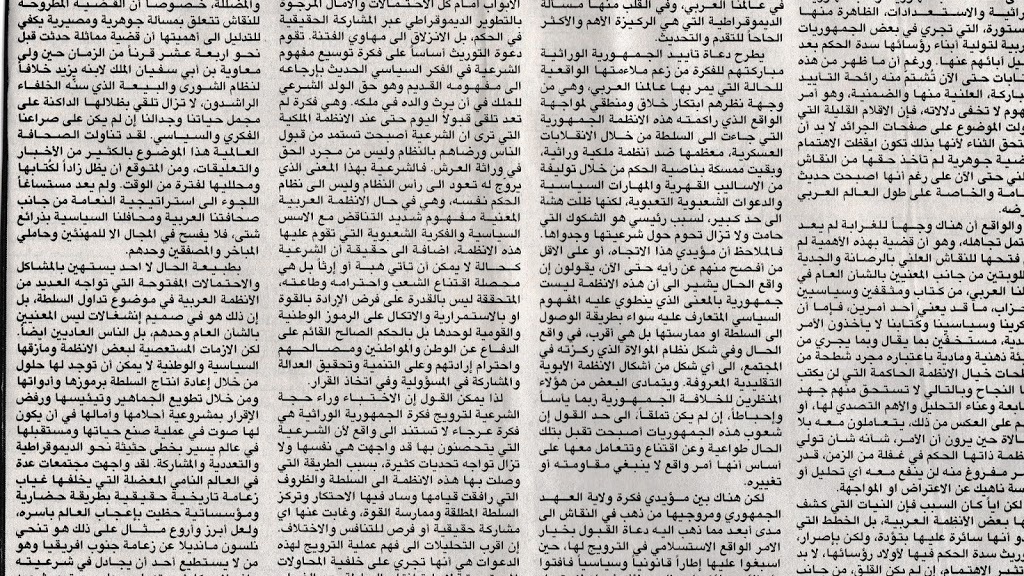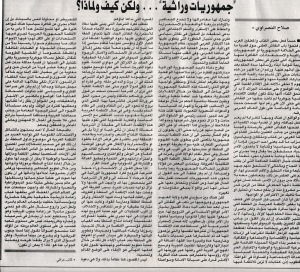Does Iraq need a president?
Images showing the ailing Iraqi president in good health appear ominous, writes Salah Nasrawi
Dashing in a light blue suit and red tie, the ailing Iraqi President Jalal Talabani in the video sits with white clad medical staff in a German hospital. The footage released by his office was meant to assure Iraqis that Talabani was responding to medical treatment and is showing signs of improvement.
Talabani remains voiceless in the pictures but the head of his medical team, Najmaldin Karim, was cited by the presidential office as saying the 79-year-old president who was airlifted to Germany for treatment from a critical stroke in December would be able to return home as soon as his treatment was finished.
Karim, a neurosurgeon who oversees Talabani’s medical care and also a senior member of Talabani’s political party and a governor of the Iraqi province of Kirkuk, however, gave no details about the ailing leader’s condition.
There have been conflicting reports about the real status of Talabani’s health amid criticism to the government for its handling of the president’s illness and for keeping the Iraqi public in the dark about the president’s health.
Rumours have been abundant about Talabani’s health condition as his convalescence coincides with one of Iraq’s most serious political crises and its deadliest period of ethno-sectarian strife since the United States pullout in 2011.
Some reports have suggested that Talabani is clinically dead in the Berlin hospital where he is treated, others said the enfeebled president has handed his will to one of the leaders of his party.
Regardless of the furious speculations among Iraqis about Talabani’s health conditions, his prolonged absence has sparked a debate about whether he will be physically able to resume official duties.
According to various medical studies, persons who had strokes mostly develop serious physical and emotional problems occurring after recovery and they will need prolonged treatment.
Common problems among survivors of strokes are partial paralysis and speech and vision disability and in some cases the episode may be recurring.
Talabani is the founder and leader of the Patriotic Union of Kurdistan (PUK), one of the two main Kurdish groups that dominate Iraq’s northern Kurdistan region. He was named president of Iraq in 2005, becoming the first non-Arab president of an Arab country. Talabani was re-elected in April 2010 for a second term of four years.
For much of his political career Talabani was a Kurdish guerrilla fighter and an activist opposed to successive governments in Baghdad.
He entered politics as a young student joining the Kurdish Democratic Party (KDP) that was seeking autonomy under its legendary leader Mustafa Barzani.
Talabani participated in fighting as well as in diplomatic missions in the Middle East and elsewhere to drum up support for the Kurdish national movement.
He later split with Barzani and in 1976 set up along with others, mostly leftist Kurdish activists, the PUK in an attempt to redefine the Kurdish political movement.
Critics say that Talabani has changed sides so often and note that he has a long history of political opportunism. At times he had aligned with Saddam Hussein’s regime only to shift sides with Khomeini’s Iran at various points of the 1980-1988 Iraq-Iran war.
He had a long history of alignment with such dictators like Syria’s Hafez Al-Assad and Libya’s Muammar Gaddafi in the various political feuds of the region.
Talabani played a key role as a partner of the US in the invasion of Iraq in 2003 and later he joined an interim governing council set up by the occupation administration.
But many experts say that his shifting sides and even covert alliances with regional and international secret services was dictated by the necessity to broaden Kurds’ foreign ties and outmanoeuvre their enemies, some of them major Middle East political heavyweights like Iran and Turkey.
In terms of competence, there is probably little credit to go to Talabani’s powerless presidency except probably deals he had brokered with rival sectarian leaders within the government. Under Iraq’s constitution the post of the president is ceremonial, giving key state powers to the prime minister who oversees the government, army and the security forces.
Yet, Talabani’s prolonged illness has highlighted Iraq’s fragile ethno sectarian-based political system as the country continues to be riddled with schisms that split the nation.
Politicians and analysts began debating the validity of Talabani staying in power and if it is time for Iraqis to elect a new president.
Last week Iraq’s Prosecutor-General triggered a constitutional article and asked the parliament to select a new president citing “long absence of the president of the republic from office”. Given Prime Minister Nuri Al-Maliki’s documented power grab over Iraq’s judiciary it is possible that he has influenced the judiciary to take the unusual move.
Muqtada Al-Sadr, one of Iraq’s most powerful Shia leaders and a vocal critic of the government urged the parliament to speed up the selection of a new president.
The post-Saddam Hussein constitution states that a new president should be elected whenever there is a vacancy in the post of the president for any reason to complete the remaining period of the mandate of the president.
Under a power-sharing package reached by the country’s main ethnic and sectarian groups, the president must be a Kurd while the prime minister is a Shia and the speaker of the parliament is a Sunni Arab.
Under another power sharing deal the KDP agreed to back Talabani’s bid for Iraq’s presidency in return for its leader Masoud Barzani becoming president of Kurdistan region.
All that makes Talabani’s succession a complex matter, involving national and Kurdish politics as well as regional powers and interests.
The Saudi-owned Asharq Al-Awsat newspaper reported on 14 May that arrangements were underway to choose a successor to Talabani among leaders of his party.
The paper said that Kurdish politician and a long time close aide to Talabani Barham Saleh who is also the PUK’s second deputy secretary-general is the party’s only candidate for the position.
The paper suggested that Iran, Baghdad’s Shia-led government key ally which is believed to have stakes in northern Iraq and enjoys close ties with Talabani’s party is showing interests in Talabani’s succession. Iran apparently tries to secure influence to encounter Turkey’s clout with the KDP and Iraqi Sunni Arabs.
The paper said Iranian officials have discussed the successions with both Saleh and Talabani’s wife Hiro Ibrahim Ahmed who visited Tehran this month. Iran is working on the assumption that even if Talabani returns to Kurdistan in good health, he will not be able to return to his post as president of the country, Asharq Al-Awsat quoted a source as saying.
Another striking factor in Talabani’s succession is the dichotomy of opinion within Kurdish parties. On 23 May Kurdish news outlet Rudaw reported that Iran has proposed a temporary leadership council for the PUK in the absence of Talabani, and “has set preconditions for approving” Saleh as Iraq’s president.
Under a banner headline “Iran Calls the Shots on PUK Leadership Issue” the outlet quoted Fareed Asasard, a PUK leadership member as saying that “Iran has suggested a collective leadership for the PUK through a proposed council, which is currently being discussed within the party.”
The outlet quoted another party leader as saying that Iran’s preconditions for backing Saleh as a new president of Iraq includes pledges to support Tehran’s policies in Iraq, cooperation with Iraqi Shia groups and distancing himself from the US and Turkey.
On 13 May Rudaw reported that Talabani’s return remains unclear and quoted his German doctors as saying his recovery is slow and difficult because he did not receive adequate treatment immediately after the stroke.
Rudaw is known to be close to the KDP whose leaders are in the midst of serious disagreements with their ruling partners in the PUK over the re-election of Barzani for a third term as president of Iraq’s Kurdistan Region.
In a statement, Saleh said that talking about Talabani’s succession while the president is recovering “is inappropriate and unfeasible”, underlying tension between the two main Kurdish parties.
The mess surrounding Talabani’s health condition and succession, therefore, begs the question: Does Iraq really need a president?
Is it necessary that a politician be paid some $1 million a month in salaries and allowances to do ceremonial duties such as attending international conferences and receive accreditations of foreign envoys?
This report will argue that Iraqis are just wasting their money and resources on a mere ceremonial post that is dividing rather than uniting them and it is time to try to find an alternative.









